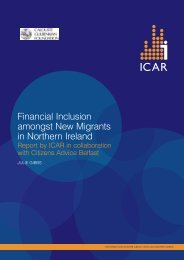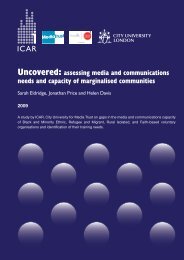Navigation guide Refugee populations in the UK: Algerians - ICAR
Navigation guide Refugee populations in the UK: Algerians - ICAR
Navigation guide Refugee populations in the UK: Algerians - ICAR
You also want an ePaper? Increase the reach of your titles
YUMPU automatically turns print PDFs into web optimized ePapers that Google loves.
Islamism, though <strong>the</strong> relationship between <strong>the</strong> two is undoubtedly more complex than this. 1<br />
Raï has become far more respectable and ma<strong>in</strong>stream <strong>in</strong> recent years and many raï s<strong>in</strong>gers now wish to<br />
distance <strong>the</strong>mselves from <strong>the</strong> associations of raï with more excessive behaviour. Raï spread to France<br />
<strong>in</strong> <strong>the</strong> mid-1980s and it was well known and commercially successful by <strong>the</strong> early 1990s. Today <strong>the</strong><br />
most <strong>in</strong>fluential musicians, such as Khaled or Cheb Mami, are <strong>in</strong>ternationally known. There are currently<br />
two accomplished raï musicians liv<strong>in</strong>g and perform<strong>in</strong>g regularly <strong>in</strong> <strong>the</strong> <strong>UK</strong>. Abdelkader Saadoun has an<br />
<strong>in</strong>formative website with details of his upcom<strong>in</strong>g concerts and his last album, Saadia. Abdel Ali Slimani<br />
has two albums: Mraya (2000) on Real World and Espoir (2003) on Harmonia Mundi.<br />
1 Marc Schade-Poulsen has conducted an extremely <strong>in</strong>terest<strong>in</strong>g ethnography explor<strong>in</strong>g <strong>the</strong> social significance of<br />
raï <strong>in</strong> his book Men and popular music <strong>in</strong> Algeria (1999), University of Texas Press. Extracts from this book can be<br />
found at http://<strong>in</strong>ic.utexas.edu/menic/rai/ [accessed 5 May 2004].<br />
Film<br />
One of <strong>the</strong> most famous Algerian films, The Battle of Algiers (1966) was actually directed by an Italian, Gillo<br />
Pontecorvo. It tells <strong>the</strong> story of <strong>the</strong> fight for <strong>the</strong> capital between January and March 1957. It is astonish<strong>in</strong>g to<br />
imag<strong>in</strong>e <strong>the</strong> major events of this battle re-enacted <strong>in</strong> Algiers less than four years after <strong>the</strong> end of <strong>the</strong> war.<br />
Many of <strong>the</strong> major figures <strong>in</strong> <strong>the</strong> battle, <strong>in</strong>clud<strong>in</strong>g Saadi Yacef, <strong>the</strong> head of <strong>the</strong> FLN’s Algiers network,<br />
actually play <strong>the</strong>mselves <strong>in</strong> <strong>the</strong> film, mak<strong>in</strong>g it an extremely important historical document, as well as a<br />
valuable recreation of one of <strong>the</strong> most famous episodes of <strong>the</strong> entire war.<br />
Algerian directors soon became established overseas. In 1975, Chronique des années de braise (Chronicle<br />
of <strong>the</strong> years of embers) won <strong>the</strong> Palme d’Or at Cannes. The follow<strong>in</strong>g year, <strong>the</strong> now celebrated director<br />
Merzak Allouache released his first film, Omar Gatlato (1976) which explored divisions and destitution <strong>in</strong> <strong>the</strong><br />
suburb of Algiers where he lived, Bab el Oued. After produc<strong>in</strong>g a number of acclaimed documentaries for<br />
television, Allouache returned to Bab el Oued almost 20 years later to film <strong>the</strong> rise of <strong>the</strong> Islamist movement.<br />
The result<strong>in</strong>g Bab el Oued City won <strong>the</strong> International Critics Prize at Cannes <strong>in</strong> 1994. He recorded his<br />
experiences of mak<strong>in</strong>g <strong>the</strong> film <strong>in</strong> an enterta<strong>in</strong><strong>in</strong>g book of <strong>the</strong> same name (1995, Le Seuil, Paris). In 1995<br />
Allouache turned to comedy with Salut Cous<strong>in</strong>!, a complex story of travel and trade between Algeria and<br />
Paris and his most recent film Chouchou (2003) is also very light hearted.<br />
The novelist Assia Djebar has also made a number of powerful films address<strong>in</strong>g similar issues as her books;<br />
<strong>the</strong> history of Algeria and <strong>the</strong> place of women <strong>in</strong> construct<strong>in</strong>g that history. Her first film, La Zerda et les<br />
Chants de l’oubli (1978) mixed documentary and narrative techniques to relate <strong>the</strong> story of a woman who<br />
returns to Algeria 15 years after <strong>in</strong>dependence and is caught up <strong>in</strong> her memories of <strong>the</strong> war. There is of<br />
course no reason why Algerian filmmakers should restrict <strong>the</strong>mselves to <strong>the</strong> subject of Algeria, although<br />
many have done. A notable exception is Rachid Bouchareb’s Little Senegal (2000) which tells <strong>the</strong> story of a<br />
young man’s migration from Senegal to a neighbourhood of Harlem.<br />
Film<strong>in</strong>g <strong>in</strong> Algeria over <strong>the</strong> past decade has been extremely difficult and little was produced dur<strong>in</strong>g <strong>the</strong> 1990s<br />
o<strong>the</strong>r than a small number of documentaries, such as Femme Taxi à Sidi Bel-Abbés (2000) <strong>in</strong> which director<br />
Belkacem Hadjadj constructed a portrait of <strong>the</strong> only female taxi driver <strong>in</strong> Sidi Bel-Abbés, a town <strong>in</strong> western<br />
Algeria. Algerian directors have filmed outside of Algeria, often reta<strong>in</strong><strong>in</strong>g <strong>the</strong> <strong>the</strong>me of <strong>the</strong> war, such as<br />
Merzak Allouche’s (1999) Algiers Beirut, filmed almost entirely <strong>in</strong> Beirut about an Algerian who has come to<br />
<strong>Navigation</strong> <strong>guide</strong> to refugee <strong>populations</strong>: <strong>Algerians</strong><br />
©<strong>ICAR</strong> 2004, moral rights Michael Collyer<br />
37

















